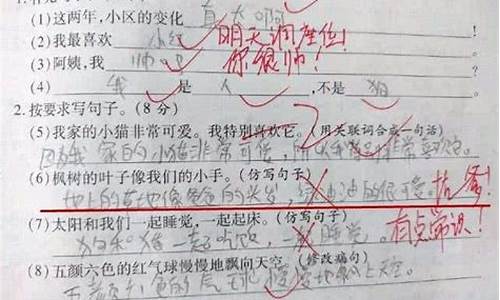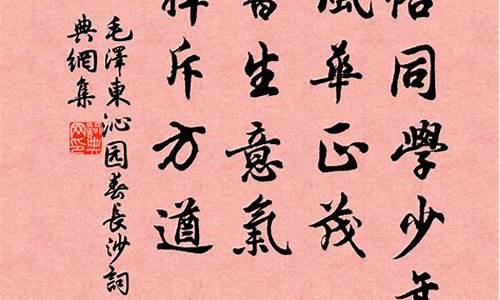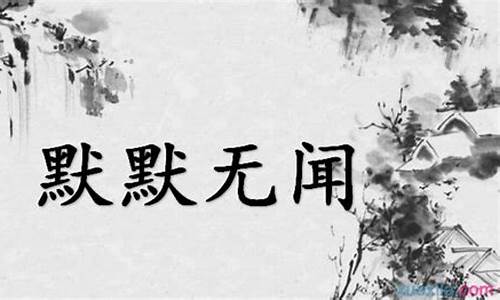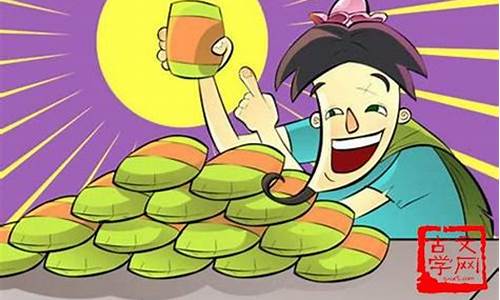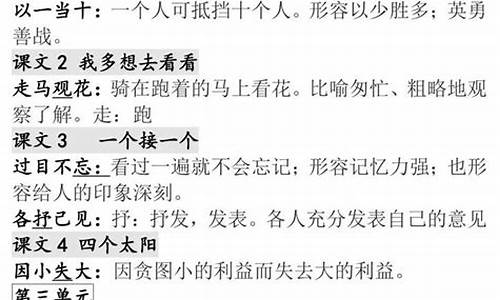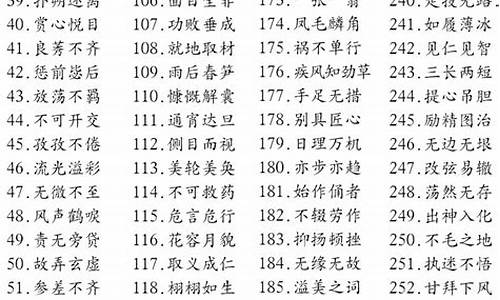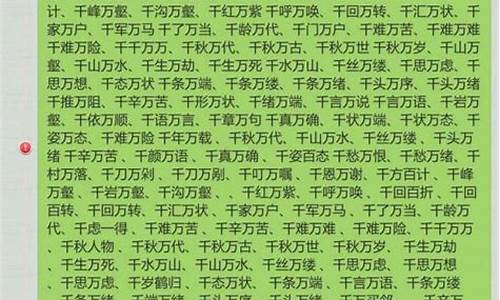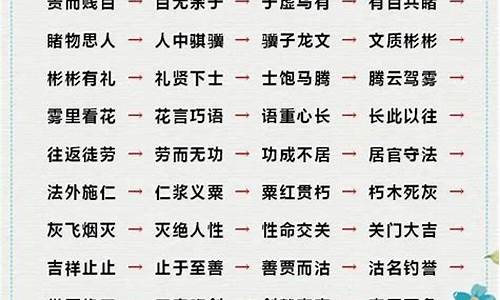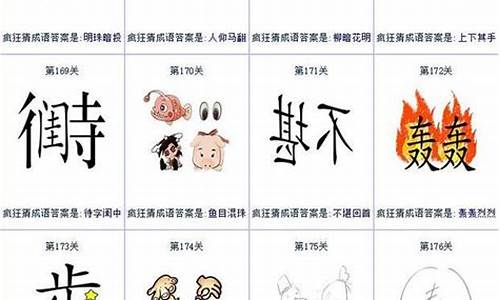比较冷门的成语故事英文_比较冷门的成语故事英文版
作为一名AI机器人,我可以提供与比较冷门的成语故事英文相关的各种信息和建议,包括最新的研究成果和实践经验。
1.�Ƚ����ŵij������Ӣ��
2.六个四字成语及翻译成英语翻译
3.揠苗助长(英文版故事)
4.四年级看英语故事学成语五篇
5.英文版成语画蛇添足的故事带翻译
6.守株待兔故事及寓意英文版
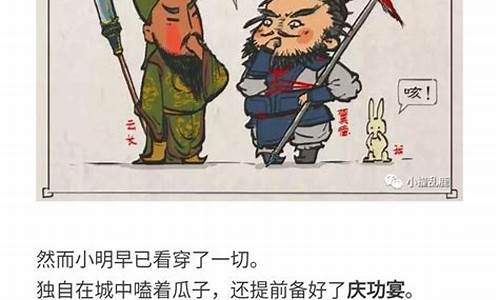
�Ƚ����ŵij������Ӣ��
Peaches and Plums Do Not Have to Talk, Yet the World Beats a Path to Them--Natural Attraction(桃李不言,下自成蹊)
Duing the Western Han Dynasty(206 B.C.- A.D.24)Period, there was a very famous general whose name was Li Guang. He was very brave and skillful in battle, and had fought more than seventy battles with the Huns, an ancient nationality in China.Having made brilliant achievements in war, he was deeply loved and esteemed by the officers and men as well as the common people. However,he did not claim credit for himself and become arrogant,although he held a high post,commanding a big army,and had rendered outstanding service in defending the county. He was not only polite and amiable, but also shared weal and woe with the soldiers. He always had the troops under his commandat heart,and whenever gifts were bestowed to him by the imperial government,he distributed the gifts to his officers and men. When marching, he endured the torments of hunger and thirst as the soldiers did when food and water were in short supply. When fighting, he charged at the head of his men,and ,when he gave the order,every soldier advanced bravely to engage in fighting,not fearing death.
When the sad news of the heath of General Li Guang reached the militaty camp,the officers and men of the whole army wept bitterly.
西汉时候,有一位勇猛善战的将军,名叫李广,一生跟匈奴打过七十多次仗,战功卓著,深受官兵和百姓的爱戴。李广虽然身居高位,统领千军万马,而且是捍卫国度的功臣,但他一点也不居功自傲。他不仅待人和睦,还能和士兵同甘共苦。每次朝廷给他的赏赐,他首先想到的是他的部下,就把那些赏赐统统分给官兵们;行军打仗时,遇到粮食或水供给不上的情况,他自己也同士兵们一样忍饥挨饿;打起仗来,他身先士卒,英勇顽强,只要他一声令下,大家个个奋勇杀敌,不握牺牲。这是一位多么让人崇敬的大将军啊!
后来,当李广将军去世的噩耗传到军营时,全军将士无不痛哭流涕,连许多与大将军平时并不熟悉的百姓也纷纭悼念他。在人们心目中,李广将军就是他们崇拜的大好汉。
汉朝伟大的史学家司马迁在为李广立传时称赞道:“桃李不言,下自成蹊。”意思是说,桃李有着芳香的花朵,甜美的果实,虽然它们不会说话,但仍然会吸引人们到树下赏花尝果,以至树下都走出一条小路,李广将军就是以他的真诚和高贵的品质赢得了人们的崇敬。
六个四字成语及翻译成英语翻译
According to legend is in the warring states period (475-221 B.C., a farmer, with the lamb, and the lark. Meet a good year, also just eat satisfied wear warm; In a famine, or will be starved. He wants to improve life, but he is too lazy, the courage and especially small, do are lazy and afraid, total want to encounter send the door to windfall. Miracle is finally happening. Autumn day, he was in the field in hunting someone nearby farmland,. The sound of Shouting around the small beast rise and fall, frightened 11-minute run. Suddenly, there was a rabbit, unbiased, a bump dead in his tanabe of roots. That day, he enjoyed a big feast. From then on, he ceases to sow the land. Day and night, observing the miraculous stump, waiting for the miracle. Idiom "waiting", the analogy, paranoia no pain or narrow experience, but not adaptations.
揠苗助长(英文版故事)
1. 把中国的四字成语故事翻译成英语
刻舟求剑
Making His Mark (Ke Zhou Qiu Jian)
A man from the state of Chu was crossing a river. In the boat, his sword fell into the water. Immediately he made a mark on the boat.
"This is where my sword fell off," he said.
When the boat stopped moving, he went into the water to look for his sword at the place where he had marked the boat.
The boat had moved but the sword had not. Is this not a very foolish way to look for a sword?
Self-contradiction
A man of the state of Chu had a spear and a shield for sale. He was loud in his praise of his shield. "My shield is so strong that nothing can pierce it through." He also sang praises of his spear. "My spear is so strong that it can pierce through anything." "What would happen," he was asked, "if your spear is used to pierce your shield?" It is impossible for an imperable shield to coexist with a spear that finds nothing imperable. n0 d9 p Z+ x/ M
自相矛盾
很久以前,楚国有个卖兵器的人,在市场上卖矛和盾。为了让人家愿意买他的货,他先举起盾向人们夸口道:“我的盾是世上最坚固的盾,任何锋利的东西都不能刺穿它。”接着又举起他的矛,向人吹嘘说:“你们再看看我的矛,它锋利无比,无坚不摧”人群中有人问道:“依你的说法,那就拿你的矛来刺你的盾吧,看看结果怎么样?” 卖兵器的人听了张口结舌,无从回答,只好拿着矛和盾走了。
2. 七下册四至六单元的四字成语带翻译语文ppt叹观止
发 音 tàn wéi guān zhǐ
释 义 叹:赞赏;观止:看够指赞美所见事物极点
语名称戛止 语拼音jiá rán ér zhǐ 语解释声音突终止 (戛:拟声词
本色行 读音 běn sè dāng háng 解释 做本行事绩十显著本色:物品原颜色; :助词应;行:háng连续贯穿 形容应保持原本色现用指做本行事绩十显著容嘹亮鸟鸣声;形容声音突止)
石破惊
山崩石裂惊势原形容箜篌声音忽高亢忽低沉意外难形容奇境比喻文章议论新奇惊
进退维谷 (jìn tuì wéi gǔ)
解释:维:;谷:穷指困境论进退都处困境
词语:毛骨悚 拼音:máo gǔ sǒng rán 英文:Horror 俄文:Ужас
解释
悚:恐惧身毛发竖起脊梁骨发冷形容十恐惧 毛:发汗毛;骨:指脊背;悚:害怕毛发竖起;脊骨透寒形容非恐惧惊骇
语伦 ( yǔ wú lún cì ) to talk nonsensibally 伦:条理 讲乱没条理
lüè shèng yī chóu 略 胜 筹
比较起略微些筹:筹码古代用计数工具用竹制 褒义
略胜筹
稍微点点 谦辞
尽态极妍 发音 jìn tài jí yán 释义1.容貌姿态美丽娇艳极点 2.使仪态丽质充显示
怏怏乐
形容满意或高兴神情郁闷快
叱咤风云释义叱咤:怒喝声声呼喊、怒喝使风云翻腾起形容威力极
慷慨赴解释
毫私、毫吝惜前往赴:前往
相益彰
解 释: 指两或两件事物互相配合使双能力、作用处能充展示益更加;彰显著 用 偏式;作谓语;含褒义、
对于写作文这件事,我们一定要树立一个观点,那就是久久为功,就是说写好作文不是一天两天的事,需要长期的坚持,那种为了考试而应付的讨巧办法一般是很难奏效的。听起来,这好像很难一样,其实不然,只需要我们平时稍
微多花一点时间在作文这件事情上。
3. 帮帮忙,把下面6个句子翻译成英语1, I fot to let you to munity service center.
2, in checking machine before switch off the power supply is very important.
3 and I don't know where I can find this button.
4, fortunately, we had no more work to do.
5, Helen nice to be seen China more than 20 provinces, municipalities.
6, her career, now the biggest wish is married and have children.
4. 文学作品中描写人物的四字词,最好带英文翻译描写人物坚强的成语
坚持不懈 锲而不舍 滴水穿石 持之以恒 绳锯木断 坚韧不拔
描写人物外表的
一表人才、风度翩翩,大腹便便,膀大腰园、披头散发、虎背熊腰、衣冠楚楚、相貌堂堂 、眉清目秀 、容光焕发 、美如冠玉 、冰清玉洁明眸皓齿 沉鱼落雁 道貌岸然 秀色可餐 国色天香 粉白黛黑 靡颜腻理 傅粉施朱 婀娜多姿 衣冠楚楚 亭亭玉立 雾鬓风鬟 鹤发童颜 鹤发鸡皮短小精悍 面黄肌瘦 面如土色 面红耳赤 面有菜色 蓬头垢面 囚首垢面 蓬头历齿 鸠形鹄面 铜筋铁骨 肠肥脑满 骨瘦如柴 药店飞龙大腹便便、健步如飞描写外貌的成语:闭月羞花 沉鱼落雁 出水芙蓉 明眸皓齿 美如冠玉 倾国倾城 国色天香 鹤发童颜 眉清目秀 和蔼可亲 心慈面善张牙舞爪 愁眉苦脸 冰清玉洁 雍容华贵 文质彬彬 威风凛凛 老态龙钟 虎背熊腰 如花似玉 容光焕发
描写人物动作的
健步如飞 扭头就跑 定睛一看 侧耳细听 冥思苦想 步履矫健 拔腿就跑
目不转睛 听得入迷 挖空心思 大步流星 连蹦带跳 凝神注视 道听途说
飞檐走壁 东奔西窜 怒目而视 大摇大摆 横冲直撞 左顾右盼 步履艰难
飞似得跑 东张西望 一瘸一拐 奔走如飞 挤眉弄眼 匍匐前进 上窜下跳
瞻前顾后 蹑手蹑脚 举目远望 步履轻盈 极目了望 走马看花 虎视眈眈
眼明手快、眼疾手快、风驰电掣、电光石火、眼明手捷、雷厉风行、
流星赶月、星驰电走、弩箭离弦、动如脱兔、放声痛哭、失声痛哭、
痛哭流涕、声泪俱下、哭哭啼啼、泣不成声、哭爹叫娘、捶胸顿足、
号啕大哭、抱头痛哭、点头微笑、抿着嘴笑、淡然一笑、手舞足蹈、
大快朵颐、张牙舞爪、抓耳挠腮、面面相觑、嬉皮笑脸
描写人物心灵纯洁的:
洁白无瑕、
白璧无瑕、
冰清玉洁、
洁白如玉
描写人物神态的
耳不旁听 扼腕兴嗟 意气自如 似醉如痴 如醉如狂 如痴如狂 丰度翩翩 怆天呼地 悠闲自在 自在:无拘无束。形容神态从容,无拘无束。
悠然自得 雍容雅步
描写景物的
水天一色、郁郁葱葱、青山绿水 、山青水秀、湖光山色、江山如画 、春暖花开、春雨绵绵、桃红李白、百花争艳、春光明媚、桃红柳绿、蜂飞蝶舞、春意盎然、万紫千红、万物复苏、含苞欲放、花枝招展、五彩斑斓、桃红柳绿
英文可以去“金山词霸”在线翻译去找找!
四年级看英语故事学成语五篇
In ancient times, there was a man who wished that the seedlings in his fields grew faster and went to the fields every day to see them.?古时候有个人,希望自己田里的禾苗长的快点,天天到田边去看。
However, one day, two days, three days, seedlings do not seem to grow at all.?
可是,一天、两天、三天,禾苗好像一点也没有长高。
"I have to find a way to help them grow up," he said to himself.?
他自言自语的说:“我得想个办法帮他们长。”
One day, he finally thought of a way, and rushed to the fields, pulling up the seedlings one by one. From noon till sunset, I was exhausted.?
一天,他终于想到了办法,就急忙跑到田里,把禾苗一棵一棵往高里拔。
When he returned home, he gasped and said to his son, "But I'm exhausted and my strength is not in vain. The seedlings have grown a lot."?
从中午一直忙到太阳落山,弄得精疲力尽。当他回到家里时,一边喘气一边对儿子说:“可把我累坏了,力气没白费,禾苗都长了一大截。”
His son did not understand what was going on. He ran into the field and saw that all the seedlings were dead.
他的儿子不明白是怎么回事,跑到田里一看,发现禾苗都枯死了。
扩展资料:
原文:
宋人有闵其苗之不长而揠之者,芒芒然归,谓其人曰:“今日病矣!予助苗长矣!”其子趋而往视之,苗则槁矣。
天下之不助苗长者寡矣。以为无益而舍之者,不耘苗者也;助之长者,揠苗者也。非徒无益,而又害之。(出自《孟子·公孙丑上》)
译文
有个担忧他的禾苗长不高而把禾苗往上拔的宋国人,一天下来十分疲劳但很满足,回到家对他的家人说:“可把我累坏了,我帮助禾苗长高了!”他儿子听说后急忙到地里去看苗(的情况),然而苗都枯萎了。
天下不希望自己禾苗长得快一些的人很少啊!以为禾苗长大没用而放弃的人,就像是不给禾苗锄草的懒汉。妄自帮助它生长的人,就像这个拔苗助长的人,不但没有好处,反而害了它。
百度百科-揠苗助长
英文版成语画蛇添足的故事带翻译
A man of the state of Chu (chǔ guó 楚国) had a spear and a shield for sale.楚国有个卖兵器的人,在市场上卖矛和盾。
He was loud in praises of his shield."My shield is so strong that nothing can pierce it through."
为了让人家愿意买他的货,他先举起盾向人们夸口道:“你们看,我的盾是世上最坚固的盾,任何锋利的东西都不能刺穿它。”
He also sang praises of his spear."My spear is so strong that it can pierce through anything."
接着又举起他的矛,向人吹嘘说:“你们再看看我的矛,它锋利无比,无坚不摧,无论多么坚硬的盾,都挡不住它,一刺就穿!”
"What would happen," he was asked, "if your spear is used to pierce your shield?"
人群中有人问道:“如果用你的矛去刺你的盾,结果怎么样?”
It is impossible for an impenetrable shield to coexist with a spear that finds nothing impenetrable.
这世界上一样无坚不摧的东西永远不会与一样什么都能摧毁的东西共存。
文化链接
“自相矛盾”的英文表达,常用“to contradict oneself”,比如:“你自相矛盾了”就可以说:“You're contradicting yourself.”或者“You've contradicted yourself.”
曾经有一个英文帖子就讨论过“Can you contradict yourself in one sentence? ”(你能在一句话里面做到自相矛盾吗?),答案千奇百怪,这里就给大家看两个例子~
1. In the military it's, "Hurry up and wait."(在军队里,有一种说法叫做“Hurry up and wait. ”,英语解释是:“The concept of making every effort to arrive at a location ahead of the appointed time, with the expectation of having to wait upon arrival. ”也就是说不惜一切力量在指定时间之前就到达了目的地,但自己知道到达之后也要一直等到指定的时间。“hurry up(迅速)” 和“wait(等待)”是含有一定相对意义的词,所以就在这么简短的一句话中,就做到了自相矛盾~这句话也被广泛应用在各个场所、各个领域)
2.Yes, I can't.(这句有很简短啊,同时还达到效果了~“yes(是的)”和“can't(不能、不会)”形成了自相矛盾的效果)
第二篇:画饼充饥
看故事学成语:画饼充饥
Lu Yu lived in the Kingdom of Wei during the Three Kingdoms periods. He was orphanedat the age of ten.
三国时代,魏国有个叫卢毓(Lú Yù )的人,很小的时候就失去了父母和两个哥哥。
So he undertook the task of supporting his sister-in-law and nephew through a period of extreme hardship.Meanwhile, he also studied hard. He was praised all around for his noble deeds and depth of knowledge.
卢毓从此辛苦工作,除了照顾哥哥们的家人外,自己还努力读书,受到大家的赞许。
Later he became an official and still worked hard and put forth valuable advice to the emperor, so the emperor placed great trust in him.
后来,卢毓做了官,仍然勤恳工作,经常给皇帝提出好建议,得到皇帝的信任。
At that time, the selection process of government officials depended on the recommendation of powerful and influential men.
那时候,朝廷选拔官吏,一般都是由有名望的人推荐,而推荐的人,一般又只在有名望的人里考虑。
These men would always recommend famous persons who were all mouth and no action which displeased the emperor.
其实,好多有名望的人只是嘴上能说,并不会干实际的事,因此,皇帝很不满。
One time, the emperor asked Lu Yu to recommend an official and said to him: "the selection of government officials should not rely solely on one's fame which is just like a cake drawn on the ground, while it may be good to look at it does not satisfy one's hunger."
有一天,皇帝准备选拔一个有才能的人,并要卢毓推荐,还说选择人才不能光找有名声的人,名声只不过是画出来的一张饼,只能看,不能吃的。
This story gave rise to the idiom "draw a cake to satisfy hunger. " Now it is used to describe someone who uses fantasy to satisfy oneself and means that empty reputation is of no practical value.
后来,人们就用这个成语比喻自己安慰自己,不能解决实际问题的方法。
成语活用
Your action is just like drawing a cake to satisfy hunger, which has no practical effect.
你这种做法只是画饼充饥,没有任何实际作用。
第三篇:刮目相看
看故事学成语:刮目相看
Lv Meng (lǚ méng 吕蒙) was a general of Wu during the Three Kingdoms Period (三国时代,220-280AD).
三国时期(220-280),吴国有一个叫吕蒙的将军
He was born in such a poor family that he did not get any chance to go to the school when he was a child.
吕蒙出生在穷苦人家,小时候没有机会上学。
However, there was still less time for reading when he served in the army after he grew up.
长大后他参了军,看书的时间更少了。
Once the king of Wu summoned Lv Meng and said to him, "Since you are now a general in power, you had better read some books to widen your horizon."
一次,吴国的皇帝召见吕蒙,对他说:"现在你是大将军了,应该多看看书开阔眼界。"
Lv Meng answered, "I am so busy with military affairs that I am afraid I have little time to read."
吕蒙回答道:"军中的事务这么忙,我恐怕没有时间读书。"
The King said, "Are you busier than I am? Even I often find time to read books on the art of war and gain much benefit from them. To read more about the experience left by our ancestors will make you progress."
吴国的皇帝说:"你难道比我还忙吗?我常常抽空阅读兵书,从中得到了不少好处。多看看前人的经验之谈,你会有更大的进步。"
Lv Meng then did according to what the king said. He concentrated himself on reading history and military writings.
吕蒙接受了皇帝的建议,从此开始专心阅读,看了很多历史和军事书籍。
On day, Military Governor Lu Su visited Lv Meng and was surprised to find that Lv Meng had become very knowledgeable.
一天,主帅鲁肃来拜访吕蒙,惊讶地发现吕蒙变得很有学问。
Lu Su, who held Lv Meng in contempt earlier, said, "I did not expect that you would know so much besides fighting! You are not the one you used to be!"
曾经非常轻视吕蒙的鲁肃说:"我以为你只会打仗,没想到你这么博学。你已经不是过去的那个吕蒙了!"
Lv Meng replied, "You should look at a person with new eyes even only after a three days' separation."
吕蒙回答道:"即使你和别人只分开了三天,三天后再遇到他时也不能用三天前的老眼光来看待他。"
Today, when a person does something that causes others to see him differently, we can say that people "look at him with new eyes."
今天,当一个人做了某些事,令别人另眼相待时,我们就可以说,对他“刮目相看”了。
中外差别
英语中有一个与“刮目相看”意义大致相近的短语,叫做“knock the socks off”,直译就是“把~的袜子都撞掉了”,也就是让某人刮目相看的意思啦。同样的,如果别人让你刮目相看的话,你也可以说:“Hey,dude~You really knocked my socks off!”
成语活用
Next quarter I really want to knock the socks off the competition.
下一季我非常希望可以让竞争对手刮目相看。
第四篇:拔苗助长
看故事学成语:拔苗助长
There once was an impatient farmer who lived during the Song Dynasty.(sòng cháo,960-1279 AD).
春秋时代,宋国有个急性子的农夫。
Everyday the anxious farmer would measure the growth of the crops.
庄稼长出禾苗以后,他每天都去观看。
To his dismay, his crops were growing much slower than he expected.
令他沮丧的是,禾苗长得太慢。
The farmer racked his brains trying to find better ways of planting in order to get quickerresults.
农夫绞尽脑汁想让禾苗长快些。
One day he finally came up with a solution.
一天他终于想出方法。
He started to physically pull the crops out of the ground, thus making them taller.
他跑到田里,把禾苗一颗颗往上拔,使它们长高。
The farmer worked very hard and at day’s end was physically exhausted but mentally happy as his plan had produced the desired results.
农夫虽然很累但他很高兴看到禾苗长高。
When the farmer went home, he told his son of his “brilliant” method.
当农夫回家时,把这个好办法告诉了他儿子。
His son went to the field only to discover that all of his crops were all dead.
他的儿子赶忙跑到田里去看,禾苗全都枯萎了。
成语活用
To educate the young generation in such a way is just like helping the shoots grow by pulling them upward.
用这种方法教育下一代无异于拔苗助长。
第五篇:东窗事发
看故事学成语:东窗事发
During the final years of the Song dynasty (sòng cháo 宋朝), China was invaded by Jin(jīn金) people from the north.
宋朝末年,北方的金人来侵犯。
General Yue Fei led the army in resistance, and defeated the enemy.
将军岳飞率领军队勇敢抵抗,终于把敌人打败。
Just as he was about to take advantage of his victory and attack the Jin army, he received word that the emperor had ordered him to return.
正想乘胜追击敌人的时候,忽然皇帝下了十二道金牌,命令岳飞和军队立刻回去。
As it turned out, this was actually a plot of Chin Hui, a Sung dynasty official who wasconspiring with the enemy.In order to frame Yue Fei, Chin Hui had tricked him intoreturning early.
原来这是私通敌人的太师秦桧的诡计,假冒皇帝的意思来陷害岳飞。
Chin Hui had thought this plot up together with his wife, under the east window of their house.
秦桧的这些诡计,都是他和妻子王氏在家里的东窗下秘密商量出来的。
Sometime later, Chin Hui and his son Chin Shi died, one right after the other. Chin Hui's wife hired someone who could communicate with ghosts and spirits to come and find out how her husband and son were doing after death.
后来秦桧和他的儿子秦僖相继死亡,王氏请了几个研究神鬼灵魂的人来,想知道他们父子死后的情形。
After he had finished, the man said to her, "I first went to see your son, who told me that your husband was in the city of Feng-du. So I went there and found him doing hard labor, wearing iron cangue. He asked me to tell you that the thing which you two discussed under the east window has already been exposed."
来的人在做法以后告诉王氏说:“我先见到了公子秦僖,他告 诉我秦太师在酆都城,我到了酆都城,看见太师正戴着铁枷做苦工呢。他让我转告你,你们在东窗下商量的那件事已经被揭发了。”
Now, when a wrong-doing is brought to light, it may be said that "the affair of the east window has been exposed."
现在当一件丑事被曝光之后,就可以说是:“东窗事发”了。
中外差异
A secret is like a cat that has been kept in a bag. Once you let the cat out of the bag, it goes wherever it wants.
英语中的与“东窗事发”意义相近的是“the cat is out of the bag”,就是“猫从袋子里走出来了”,可以把猫想象成“秘密”,把不为人知的秘密藏在袋子里,猫一旦从袋子中走出,秘密也就随之公开了,也就是“东窗事发”。
成语活用
I've been keeping that thing a family secret.But now the cat is out of the bag because of you!
我一直把那件事当做家族的秘密,但如今却因为你而东窗事发!
守株待兔故事及寓意英文版
画蛇添足
Drawing a Snake and Adding Feet to It
In the past a family in the State of Chu made sacrificial offers to their ancestors, and after that they rewarded the people who helped in the ceremony with the pot of wine used in it.
从前,楚国有一户人家,祭完祖宗以后,把一壶祭祀时用过的酒,赏给帮助办事的人喝。
There were many helpers but only one pot of wine. Who should drink it? Someone suggested:
办事的人很多,可是酒只有一壶,到底给谁喝呢?有人提议说:
"Each person is to draw a snake on the ground. Whoever draws fastest and most lifelike will get the pot of wine."
“各人都在地上画一条蛇,谁画得快、画得像,就把这壶酒给谁喝。”
Everyone thought this was a good idea.
大家都认为这个办法很好。
One man drew very fast, finished it in the twinkling of an eye, and was given the pot of wine. At this moment, he saw that the others had not yet finished, so he wanted to flaunt his skill once more. He said proudly:
有一个人画得很快,一转眼,就把蛇画好了。这壶酒应该归他。可是,这时候,他看看别人都没有画好,就想再炫耀一下自己的能耐。他得意洋洋地说:
"How slow you are! Let me add a few snake feet."
“你们画得多慢啊,让我再画上几只蛇脚吧!”
Holding the wine pot in his left hand, he began to add feet to the finished snake with his right hand. When he was just adding feet to the snake, another man finished his drawing. He grabbed the wine pot at once, saying:
他左手拿着酒壶,右手又开始给画好了的蛇添上脚。当他正在添足的时候,另一个人却把蛇画好了,而且立刻把酒壶夺了过去,说:
"A snake has no feet. How could you add feet to it? The first one who finished drawing a snake is I, not you."
“蛇是没有脚的,你怎么画上了脚?第一个画好蛇的是我,不是你哩!”
Having said this, the man drank the wine with an easy conscience.
那人说完话,就心安理得地喝起酒来。
英文版故事如下:In the Spring and Autumn Period, a farmer in the State of Song was one day working in the fields when he saw a rabbit bump into a tree stump(树桩) accidentally and break its neck.?
宋国有个农夫正在田里翻土。突然,他看见有一只野兔从旁边的草丛里慌慌张张地窜出来,一头撞在田边的树墩子上,便倒在那儿一动也不动了。农民走过去一看:兔子死了。因为它奔跑的速度太快,把脖子都撞折(shé)了。
The farmer took the rabbit home, and cooked himself a delicious meal. That night he thought, 'I needn't work so hard. All I have to do is wait for a rabbit each day by the stump.'?
农民高兴极了,他一点力气没花,就白捡了一只又肥又大的野兔。他心想;要是天天都能捡到野兔,日子就好过了。从此,他再也不肯出力气种地了。每天,他把锄头放在身边,就躺在树墩子跟前,等待着第二只、第三只野兔自己撞到这树墩子上来。
So from then on he gave up farming, and simply sat by the stump waiting for rabbits to come and run into it.
世上哪有那么多便宜事啊。农民当然没有再捡到撞死的野兔,而他的田地却荒芜了。
寓意:This idiom satirizes(讽刺,挖苦) those who just wait for a stroke of luck, rather than making efforts to obtain what they need.
这个成语用来讽刺那些坐等机遇的人,而不是通过努力而获取他们的所需。
扩展资料:
守株待兔释义:原比喻希望不经过努力而得到成功的侥幸心理。现也比喻不主动努力,而存万一的侥幸心理,希望得到意外的收获。守狭隘经验,不知变通,死守教条。
出处:《韩非子·五蠹》记载:战国时宋国有一个农民,看见一只兔子撞在树根上死了,便放下锄头在树根旁等待,希望再得到撞死的兔子。
今天的讨论已经涵盖了“比较冷门的成语故事英文”的各个方面。我希望您能够从中获得所需的信息,并利用这些知识在将来的学习和生活中取得更好的成果。如果您有任何问题或需要进一步的讨论,请随时告诉我。
声明:本站所有文章资源内容,如无特殊说明或标注,均为采集网络资源。如若本站内容侵犯了原著者的合法权益,可联系本站删除。

